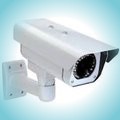- By Dan Veaner
- News
 Print
Print  The Lansing Board of Education passed a security camera policy Monday. After approving a first reading at the last meeting, a revised policy was put before the board. Board member Christine Iacobucci asked the board to consider a number of changes that sparked a lengthy discussion, but ultimately the policy was approved with only one change, the removal of an extra punctuation mark.
The Lansing Board of Education passed a security camera policy Monday. After approving a first reading at the last meeting, a revised policy was put before the board. Board member Christine Iacobucci asked the board to consider a number of changes that sparked a lengthy discussion, but ultimately the policy was approved with only one change, the removal of an extra punctuation mark.Iacobucci has opposed the use of security cameras, putting her at odds on the topic with the rest of the board. In the face of cameras being implemented, she asked several questions the new draft of the policy, saying that it is not specific enough. She noted that many districts use boilerplate camera policies from New York State, and asked about differences or omissions in the Lansing version. Other board members liked the draft, citing resaons for specific wording.
She questioned wording of a number of other portions of the policy including sections on monitoring the high school swimming pool, the number of days videos will be retained, the specific administrators who would have access to live videos during an emergency, or who would be authorized to show them to others (such as accused perpetrators, or technicians while repairing the system), whether videos would be used for employee disciplinary proceedings, and district-wide safety team responsibilities.
Swanson argued that monitoring the pool makes sense in case of catastrophic accident, saying the pool is more likely than other athletic areas to be the scene of an accident, and noting that it would be impractical to monitor the fields.
"I think the risk of the pool is such that here is an expectation we would have life guards," said board member Tom Robinson. "I think it's a known exception for higher risk compared to other sports that are out in the fields."
Robinson also said that retaining videos for 60 days would cover summer when the time it takes to notice items have been stolen might be longer than during the school year.
Grimm noted that videos are as likely to exonerate accused faculty or staff as to condemn them, saying that it would help take the 'he said, she said' aspect of accusations out and save time and grief for accused staff or students.
Iacobucci asked to poll students on what makes them feel safest. Swanson said that could be one piece of input, but he said that security experts have a better range of understanding of safety issues including issues impacting the use of cameras, and that a history of actual incidents should also inform decisions on camera placement. Board President Anne Drake added that administrators' input should also be taken into account.
In a line that says 'District security cameras will generally be utilized in public areas where there is no "reasonable expectation of privacy."' Iacobucci asked to change the word 'generally' to 'only', saying it is worded with 'only' in other districts' policies.
"Why would we want to limit ourselves?" asked board member David Dittman. "There might be places the general public can't get to that we might want to monitor. It doesn't mean it's some place where people would expect privacy. It could be a storeroom."
In a discussion of who is authorized to view videos, Iacobucci noted again that she thought the proposed policy should be more detailed.
"What I am noticing is that the other districts that have similarly worded policies have much more specificity," she said. "More than ours on all of these things."
"Some of it could be the size of the district," said Board Vice President Glenn Swanson. "If you look at a big city district where they have many administrators and vice principals, there is probably a need to limit access further. Lansing has got to be on the smaller side of most of the scool districts in New York State and we only have a handfull of administrators. Any one of them would be appropriate to do this."
Board member Aziza Benson suggested changing the phrase 'security cameras' to 'surveillance cameras' in a line referring to the use of the cameras by law enforcement officials. But Grimm said the district's attorneys recommended using the phrase 'security cameras' throughout the policy.
After lengthy discussion of these issues the board voted 6/1 to approve the second reading without changes, and again to approve the policy, with Iacobucci dissenting.
Superintendent Stephen Grimm said that as the board gains experience with security cameras and policy it can choose to amend or change the policy at any time in the future.
v7i48



